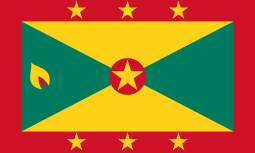Grenadian general election, 1999
 |
| This article is part of a series on the politics and government of Grenada |
|
Legislative |
|
| Administrative divisions (parishes) |
| Foreign relations |
General elections were held in Grenada on 18 January 1999.[1] The governing New National Party of Prime Minister Keith Mitchell was re-elected after winning all 15 seats. Voter turnout was 56.5%.[2]
Background
The last election in 1995 saw the then governing National Democratic Congress defeated by the New National Party, which won 8 of the 15 seats.[3] However the New National Party lost their majority in late 1998 after the Foreign Minister Raphael Fletcher was one of 2 ministers to quit the party accusing the government of corruption.[4][5] As a result Parliament was dissolved 18 months before the end of its term on 2 December 1998,[5] and on 14 December the election date of 18 January was announced.[6]
48 candidates stood in the election, including 2 independents, for the 15 seats which were elected by first-past-the-post.[6] Candidates included a full 15 candidates from the New National Party, 12 from the National Democratic Congress and 9 from the Grenada United Labour Party.[6]
Campaign
The governing New National Party of Kevin Mitchell campaigned on pledges to preserve stability and bring about economic growth.[7] Mitchell said that his government would create jobs by increased spending on infrastructure and by attracting foreign investment.[6]
Meanwhile the opposition, comprising a loose alliance between the National Democratic Congress and the Grenada United Labour Party, attacked the government for corruption.[7] They alleged that there had been issues with the awarding of contracts and that the Prime Minister had been involved with foreign investors with shady backgrounds.[7] The opposition also said the government was not doing enough for health care,[6] and they in particular attacked a decision to build a stadium instead of a hospital.[7] However the opposition suffered divisions, with disagreement between the two opposition parties over who should become Prime Minister if they won the election.[7]
Results
The results saw the governing New National Party re-elected after winning all 15 seats contested.[8] Among the victorious candidates for the governing party was the Prime Minister Keith Mitchell, who won his own seat of St George's Northwest with 89% of the vote.[5] This was only the second time a government had been re-elected in Grenada and the first since 1974.[6][9]
The government's record in attracting investment and increasing economic growth was seen as having gained support for the New National Party, while the opposition said that the six-week campaign had been too short for them to prepare for the election.[5] Election monitors from the Organisation of American States observed the election and said that it had been "free and fair".[6]
| Party | Votes | % | Seats | +/- |
|---|---|---|---|---|
| New National Party | 25,896 | 62.5 | 15 | +7 |
| National Democratic Congress | 10,396 | 25.1 | 0 | -5 |
| Grenada United Labour Party/United Labour | 4,853 | 11.7 | 0 | -2 |
| Maurice Bishop Patriotic Movement | 260 | 0.6 | 0 | 0 |
| Good Old Democratic Party | 12 | 0.0 | 0 | 0 |
| Independents | 38 | 0.1 | 0 | 0 |
| Invalid/blank votes | 203 | - | - | - |
| Total | 41,658 | 100 | 15 | 0 |
| Source: Nohlen | ||||
References
- ↑ Nohlen, D (2005) Elections in the Americas: A data handbook, Volume I, p307 ISBN 978-0-19-928357-6
- ↑ Nohlen, p311
- ↑ "Grenada: parliamentary elections House of Representatives, 1995". Inter-Parliamentary Union. Retrieved 2010-06-02.
- ↑ Wren, Christopher S. (4 December 1998). "World Briefing". The New York Times. Retrieved 2010-06-02.
- 1 2 3 4 "Grenada PM wins second term". BBC News Online. 19 January 1999. Retrieved 2010-06-03.
- 1 2 3 4 5 6 7 "Grenada: parliamentary elections House of Representative, 1999". Inter-Parliamentary Union. Retrieved 2010-06-02.
- 1 2 3 4 5 "Voters cast ballots in Grenada election". Sun Journal. 19 January 1999. p. 2.
- ↑ "Grenada's government win landslide victory". BBC News Online. 19 January 1999. Retrieved 2010-06-03.
- ↑ "Grenada PM takes oath". Daily News. 24 January 1999. Retrieved 2010-06-03.